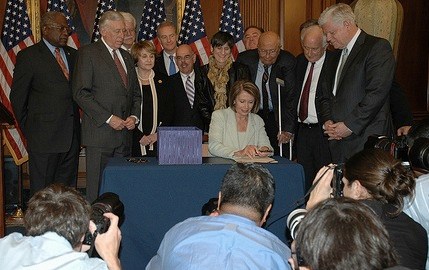Death Threats Follow the Signing of Health Care Reform

As he entered the Capitol building to vote on the health care bill, Rep. Emanuel Cleaver (D-MO) was spit on. Rep. John Lewis (D-GA), a prominent civil rights leader, was called a “nigger.” Rep. Ciro Rodriguez (D-TX) was called a “wetback.” And Rep. Barney Frank (D-MA) was called a “faggot.” Someone threw a brick through the window of Rep. Louise Slaughter’s (D-NY) district office.
Another person threw a rock through the window Rep. Steve Driehaus’ (D-OH) district office in Cincinnati. On the floor of the House, Rep. Randy Neugebauer (R-TX) called Bart Stupak (D-MI) a “baby-killer.” House Majority Leader Steny Hoyer (D-MD) says more than 10 members of Congress have received threats. Someone faxed Stupak a drawing of a noose and gallows with his name on it.
Let’s be clear. A lot is at stake with this health care bill. It will affect the quality and length of people’s lives, as well as the nation’s long-term financial health. Nevertheless, for the most part at the bottom of the debate over health care are honest disagreements over complicated policy questions. The bill might be a mistake—no one really knows for sure—but it does not represent some kind liberal putsch taking control of the federal government. It is not a step toward Stalinism. It’s a real stretch to say it will directly harm any unborn babies. It was in any case passed by a majority of duly elected representatives who won their elections campaigning on passing just such a bill. It’s not even a particularly liberal bill, but is full of proposals Republicans supported just a few years ago. And while its opponents are extremely passionate, the American public as a whole is about evenly split on whether it’s a good thing or a bad thing. If ultimately the public doesn’t like the bill, they can elect new representatives and have it repealed. There’s no reason to attack public servants who are simply doing their best to craft legislation in the public interest.
The Democrats are milking the slurs and the threats for all their worth. Rep. Eric Cantor (R-VA) has slammed them for trying to make political hay of the threats, saying they are “dangerously fanning the flames” by using these incidents as a political weapon. He told the media that someone shot bullet through a window of his campaign office this week too, but that he wouldn’t publicize the attack to make a political point. But—setting aside the fact that was exactly what he was in fact doing—if Cantor is right that the Democrats are using the threats against them for political gain, the Democrats have a point when they accuse the Republicans of encouraging such threats
To his credit, House Minority Leader John Boehner (R-OH) released a statement today saying that violence and threats are unacceptable. But he could have been clearer about that earlier. Just a few days ago Boehner was saying that the Democrats will “ruin our country” and that the health care vote amounted to “Armageddon.” Sarah Palin, of course, famously claimed the bill would set up “death panels” empowered to euthanize the elderly. Others Republicans have repeatedly compared Obama to Hitler and the Democrats’ plan to Soviet communism. Many insisted that passing the bill was equivalent to killing babies. As the bill was passing, Rep. Marsha Blackburn (R-TN) said, “Freedom dies a little bit today.” If any of that over-the-top rhetoric were at all true, wouldn’t violence be justified? Wouldn’t most of us kill to stop people from destroying the country, from murdering children and the elderly? How exactly did they expect people to react?
The health care bill is important. But winning policy battles isn’t everything. It’s not appropriate to proclaim that people’s lives are at stake and that their very way of life is threatened—to effectively accuse your political opponents of a coup—just to win a vote, even an important one. Someone could get hurt. As Boehner said in his statement, “Call your Congressman, go out and register people to vote, go volunteer on a political campaign, make your voice heard—but let’s do it the right way.”





